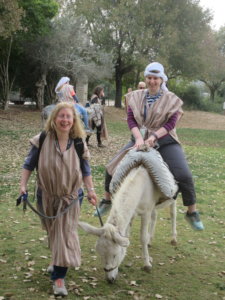I was honored to present a webinar last week as part of the Shorashim Staff Series. It was entitled, “Birthright Israel Trips and People with Disabilities: How The Israel Multisensory Classroom Benefits Participants on Specialty and Neurotypical Trips” and is available for viewing on my website https://howardblas.com/disabilities/israel-trips/.
I have been privileged to lead many Shorashim Birthright Aspergers trips and Tikvah Ramah Birthright Israel trips. I began my talk by sharing the fact that there are MANY specialized trips Birthright trips for young adults with intellectual, developmental, sensory and physical disabilities, as well as medical issues. Many participants with disabilities are fully included on typical Birthright trips; others participate in the following specialized trips:
American Sign Language
Asperger’s Syndrome
Cognitive Disorders
Developmental Disabilities
Friendship Circle
Inflammatory Bowel Disorders
Yalla: Physical Medical Disabilities
Twelve Step Recovery
Yachad: National Jewish Council for Disabilities
The first accessibility trip took place in 2001. To date, more than 2,000 participants have taken part in 75+ trips
I explained how specialized trips are structured, explored how Israel is the ultimate multisensory learning environment, and described what I think participants with disabilities “get” out of such trips—knowledge of and connection to Israel, the Jewish religion and to the Jewish People. Perhaps most important—participants form friendships!
I was delighted when, a few days after my presentation, I received a copy of the report “Breaking Barriers: A Look at Birthright Israel Specialized Trips for Participants with Disabilities,” written by Fern Chertok, Rachel Minkin, and Daniel Olson. I was one of the many participants, parents, staff members and tour leaders with whom the researchers spoke.
Chertok and Minkin also wrote an article in today’s ejwishphilanthropy, entitled, “For Young Adults with Disabilities the Loss of Specialized Birthright Trips is Particularly Poignant.” While they are sad that participants with and without disabilities will miss some opportunities to travel to Israel during these Covid-19 times, they report on the importance of such specialized trips.
Some highlights:
“Our research team observed three specialized Birthright trips for young adults with cognitive and developmental disabilities and interviewed participants, their parents, and trip leaders. Almost universally, young adults on these specialized trips described their experiences in Israel as engaging, meaningful, and fun. Participants were excited to be in the Jewish state, to learn about its history, culture, and foods and to get to know Israeli peers. In this way, their experiences were very similar to those of their peers without disabilities. However, for young adults on specialized trips, participation in Birthright Israel had additional significance: a claim to their place in the normative “coming-of-age” experience for contemporary Jewish young adults, friendships with peers with whom they share the experience of being a person with disabilities, and new levels of independence.
Participants relayed how meaningful it was that they had a Birthright experience like their friends and family members without disabilities. They described their excitement at going on a camel or jeep ride, visiting Masada, and placing notes at the Kotel. Participants now had their own Birthright stories to share just like their peers without disabilities.
Historical sites were not, however, their most meaningful experiences. During an interview, one participant, when asked what she most looked forward to on her trip, initially stated riding a camel but quickly followed up with “to make friends.” Participants told us that, starting in their teen years, they had few or no opportunities in their home communities for social interaction with peers, especially with Jewish peers. They explained how important it was to them to have friends who understood and accepted them without having to explain their disability, and how much they appreciated experiencing Birthright with peers with similar disabilities. Participants and their parents often described the social contacts gained as one of the most important outcomes of their Birthright experience. One parent called it “the first miracle,” when he realized that his adult child, for the first time, had a circle of Jewish friends.
The concept of “dignity of risk,” describes the healthy development that is possible when persons with disabilities have opportunities to step out of their comfort zone. Participants on specialized trips described as life changing, the opportunity to try out new activities and manage challenges with the help of supportive trip staff on Birthright trips. Prior to Birthright, none of these young adults had traveled extensively without family. While in Israel, participants were responsible for daily routines of self-care, managing discomforts and stresses of travel, and decisions about what to eat and how to use their discretionary funds. Participants were well aware that they were reaching for and succeeding at new milestones of independence. As one participant exclaimed, “I went by myself halfway across the world.”
I have observed just how much participants with disabilities get out of their Birthright Israel experience. As the researchers point out, many report that they have made friends for the first time. The participants from my last two Shorashim Aspergers trips have recently had Zoom bus reunions; a 2nd reunion is planned for each group this July.
My only “critique” of this trip is that we need to all do a better job getting the word out. I know Birthright is working hard on this. Let’s all shout it from the rooftops. Tell friends, and neighbors and anyone with a Birthright-aged child that there IS an Israel trip for them!


















